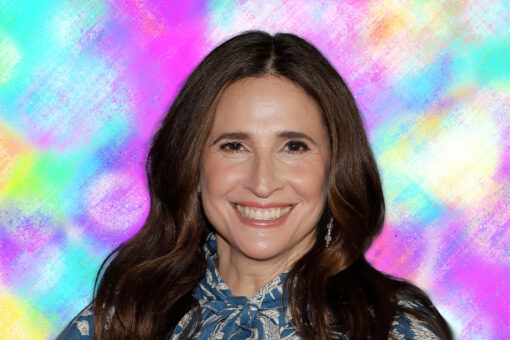Going to Jewish sleepaway camp was perhaps the most hyped up event of my childhood. Camp was a Big Deal; not only were many of my family friends already going to camp and having a blast, but my own dad tore it up in the Berkshires in the 1970s at the very same place I was about to be shipped off to.
Stories of weird snacks, beautiful sunsets, and lifelong friends filled my younger years, making me more excited than ever to start attending sleepaway camp in the summer before my fifth grade school year.
As a hopeful 10-year-old, camp really did live up to my expectations. I made many new friends and had lots of fun making lanyards in the art shack and climbing the adventure tower. I also loved Shabbat services, a time where all of camp sat together to celebrate the end of the week with reflections and songs (in the only air-conditioned building on camp, which definitely helped). Even getting sick was okay; sometimes tough things happen at camp! And with many older sister figures around, I felt like I was getting absorbed into a new little summer family, all built on Jewish values of community and caring for one another.
My camp prided itself on its return rate. The familial utopian feeling comes with a tacit agreement that you won’t leave, and when you have to go back home at the end up the summer, you will be heartbroken. I will never forget my first end of color war song session: Every kid around me was in tears, sobbing that they could never think of leaving this amazing place and going back to terrible, awful home. I, however, didn’t hate home at all. I was really excited to see my parents again, and to tell my school friends all about the great time I had. But I ended up crying anyway. Peer pressure.
Leaving was bittersweet, but more sweet with the promise of coming back. And I did. And I had fun, again not crying quite as hard as the rest of my campmates when it was time to leave. However, things changed a lot my third year.
The summer entering seventh grade was tough in a lot of ways. In the height of puberty, everyone was becoming insecure about things they never thought about before, and emotions ran high. Some girls from my original bunk started to go to camp for the full summer, and my closer friends began to clique, as groups of girls tend to do in middle school. The familiarity turned into inside jokes, ones that I couldn’t keep up with. In groups, I was never the one to talk over others, to make sure my joke was the funniest or the most heard. This wasn’t a problem at school. I had a nice group of friends, a few different groups really, who appreciated me for who I was.
That summer, no one was coming to my bunk to ask me what activities I was choosing for the week, no one was waiting for me to walk back from the dining room. I never knew who would be my buddy at buddy check during free swim. I ended up becoming friends with other kids on the outskirts, but I found that even they were fighting to be heard by the girls who were unkind to me. I knew the counselors saw me, and I could tell they tried to help. But it takes a lot to change the culture of 12-year-old girls — even good Jewish values can’t save everyone.
At some point while walking three steps behind my four closest friends, it hit me.
Maybe I saw a t-shirt from the camp-famous Ben & Jerry’s factory trip: “If it’s not fun, why do it?” Camp was a recreational place — it wasn’t compulsory like school. If it wasn’t fun for me, why did I keep going back? At that point, I had my reasons. I didn’t want to break the chain of my family members who loved this place. And I really did enjoy it at first. But after a discussion with my very understanding parents, we confirmed that staying in an unhappy situation does not serve the people that you love, anyway. Of course, every summer is different, and I was at a tough age for any kid. And of course, I was attached to the sense of place I built at camp. It wouldn’t be easy to go. But I made myself a promise: If next year wasn’t better, I wasn’t coming back.
Sadly, that next summer was even worse. In the height of bat mitzvah season, kids were as cliquey as ever, flaunting giveaways from parties they had been to together and carefully securing their future invitations. Yes, 13-year-olds did this. I made an effort to change things for myself, looking to meet new people, but friend groups had solidified, and I was solidly on the outside. I realized it was time to let go. Like all breakups, it was incredibly sad, but in this case, I knew it was for the best.
In the following years, summer always felt like it was missing something. I tried a theater sleepaway camp for one year, but it was just not the same. I began to get angry at the exclusive girls, angry at myself for letting the bullies win. I wondered what was wrong with me if my sister and other friends still loved camp and even went on to become counselors.
But in recent years, I realized that leaving camp taught me a lot about myself. By leaving that Jewish community, I found how important being with fellow Jews was to me. I had to do the work to find a more personalized Jewish community as I grew up, in my temple and later in my college Hillel.
I also learned to include the kids on the outskirts and never let myself be part of a clique. Later on in Psychology 111, I would learn that cliques are part of human nature, but of course, they can be curbed. I learned to check myself when I saw groupthink.
What I know now is that the problem with camp was not a problem with me. It was a product of unfortunate circumstances, of a particularly difficult group of kids put together, and hey, maybe a little about me. But leaving was not a sign of defeat; it was a moment of strength. I learned the valuable lesson of when to leave when something is not working, despite loyalties or attachments or family expectations. This is something so many of us, especially as women, struggle with as we grow up. To learn this lesson at such a young age is something I do not take for granted. I am very grateful for camp, for everything that it taught me, even in its absence.
Image via Utro_na_more/iStock/Getty Images Plus



